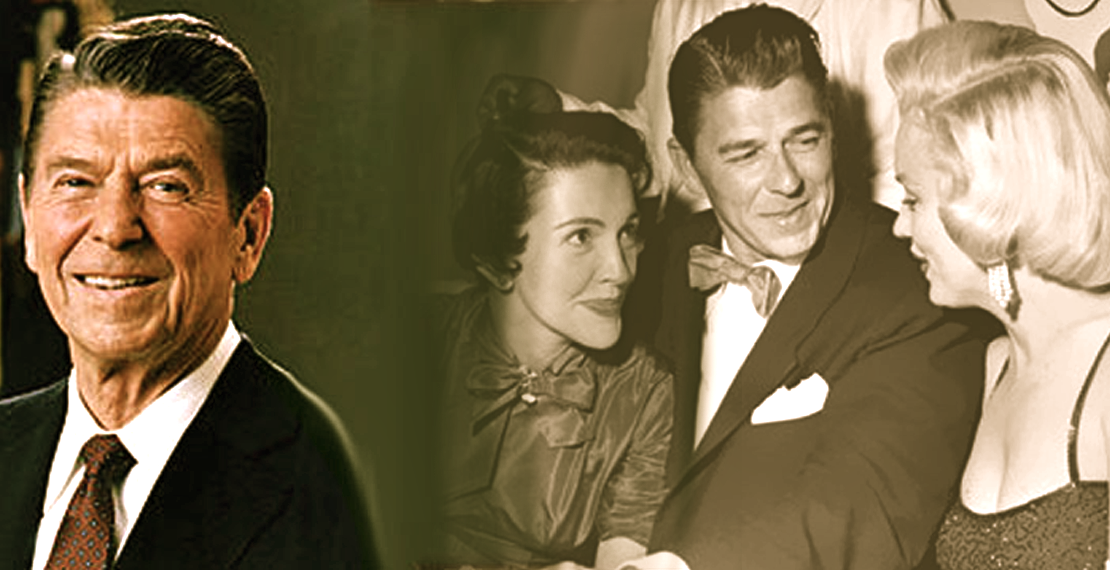Ronald Reagan

Ronald Wilson Reagan (/ˈrɒnəld ˈwɪlsən ˈreɪɡən/; February 6, 1911 – June 5, 2004) was an American politician and actor, who served as the 40th President of the United States from 1981 to 1989. Prior to his presidency, he served as the 33rd Governor of California from 1967 to 1975, following a career as an actor and union leader in Hollywood.
Raised in a poor family in small towns of Northern Illinois, Ronald Reagan graduated from Eureka College in 1932 and worked as a sports announcer on several regional radio stations. Moving to Hollywood in 1937, he became an actor, starring in a few major productions. Reagan was twice elected as President of the Screen Actors Guild, the labor union for actors, where he worked to root out Communist influence. In the 1950s he moved into television and was a motivational speaker at General Electric factories. Having been a lifelong liberal Democrat, his views changed. He became a conservative and in 1962 switched to the Republican Party. In 1964, Reagan’s speech, “A Time for Choosing“, in support ofBarry Goldwater‘s floundering presidential campaign, earned him national attention as a new conservative spokesman. Building a network of supporters, he was elected Governor of California in 1966. As governor, Reagan raised taxes, turned a state budget deficit to a surplus, challenged the protesters at the University of California, ordered National Guard troops in during a period of protest movements in 1969, and was re-elected in 1970. He twice ran unsuccessfully for the Republican nominations in 1968 and 1976; four years later, he easily won the nomination outright, going on to be elected the oldest President, defeating incumbent Jimmy Carter in 1980.
Entering the presidency in 1981, Reagan implemented sweeping new political and economic initiatives. His supply-side economic policies, dubbed “Reaganomics“, advocated tax rate reduction to spur economic growth, control of the money supply to curb inflation, economic deregulation, and reduction in government spending. In his first term he survived an assassination attempt, escalated the War on Drugs, and fought public-sector labor. Over his two terms, his economic policies saw a reduction of inflation from 12.5% to 4.4%, and an average annual growth of real GDP of 3.44%; while Reagan did enact cuts in domestic discretionary spending, increased military spending contributed to increased federal outlays overall, even after adjustment for inflation. During his reelection bid, Reagan campaigned on the notion that it was “Morning in America“, winning a landslide in 1984 with the largest electoral college victory in history. Foreign affairs dominated his second term, including ending of the Cold War, the bombing of Libya, and the Iran–Contra affair. Publicly describing the Soviet Union as an “evil empire“, he transitioned Cold War policy from détente to rollback, by escalating anarms race with the USSR while engaging in talks with Soviet General Secretary Mikhail Gorbachev, which culminated in theINF Treaty, shrinking both countries’ nuclear arsenals. During his famous speech at the Brandenburg Gate, President Reagan challenged Soviet leader Mikhail Gorbachev to “tear down this wall!” Months after the end of his term, the Berlin Wall fell and the Soviet Union collapsed soon thereafter.
Leaving office in 1989, Reagan held an approval rating of sixty-eight percent, matching those of Franklin D. Roosevelt, and later Bill Clinton, as the highest ratings for departing presidents in the modern era. While having planned an active post-presidency, in 1994 Reagan disclosed his diagnosis with Alzheimer’s disease earlier that year, appearing publicly for the last time at the funeral of Richard Nixon; he died ten years later at the age of 93. An icon among Republicans, he ranks favorably in public and critical opinion of U.S. Presidents, and his tenure constituted a realignment toward conservative policies in the United States.
Resource: Wikipedia

